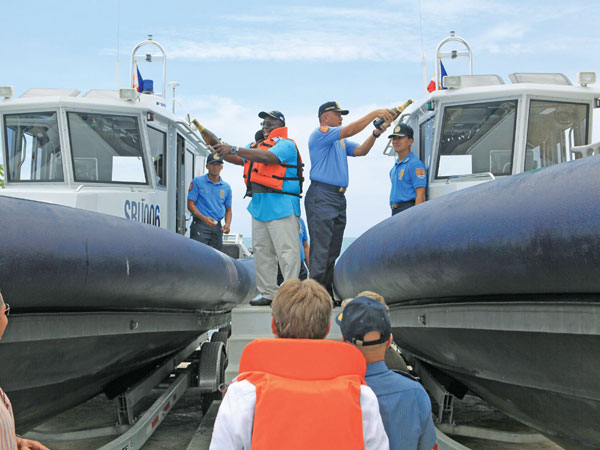
NEW PATROL BOATS US Ambassador Harry Thomas and Police Director Samuel Diciano pour champagne on two patrol boats during the turnover of $9-million worth of equipment donated by the US government to the PNP Special Boat Unit in Palawan on Thursday. PNP-PIO
Pursuing its pivot to Asia strategy, the United States on Thursday handed over to the Philippines new equipment to improve surveillance and law enforcement operations in the West Philippine Sea (South China Sea) as President Benigno Aquino prepared to meet China’s leader for talks that may include territorial disputes in those waters.
US Ambassador to the Philippines Harry Thomas turned over to police and local government officials in Palawan province two new patrol boats and two boat-towing pick-ups to support the Philippine National Police Special Boat Unit (SBU) in the island province.
The United States is also helping the Philippines build a new SBU outstation on Balabac Island, off Palawan’s southernmost tip close to Sabah in Borneo.
Police and local officials in Palawan said the new equipment would not be used for border patrols in disputed parts of the West Philippine Sea but for surveillance against transnational crimes.
Containing China
But US help to China’s rivals for territory in the West Philippine Sea is seen in Beijing as an attempt to contain China’s growing influence in the Asia-Pacific region, drawing hawkish comments from Chinese military leaders increasingly suspicious about Washington’s renewed focus on Asia.
The United States has said it has national interest in the maintenance of stability and freedom of navigation in the West Philippine Sea, parts of which US allies the Philippines, Vietnam and Taiwan claim but all of which China insists is part of its territory.
In April, China’s insistence of sovereignty over the entire sea met resistance from the Philippines, which stood its ground at Panatag Shoal (Scarborough Shoal), a reef within Philippine territory where Chinese fishermen had been caught poaching sharks and harvesting rare clams and corals. For two months, two Philippine vessels faced off with Chinese ships that sought to prevent the arrest of the fishermen until stormy weather drove the Filipinos to shelter in mid-June.
The standoff has soured relations between the two countries, but Beijing’s proffer of a bilateral meeting between President Aquino and Chinese President Hu Jintao on the sidelines of the 20th Asia-Pacific Economic Cooperation (Apec) leaders’ summit in Russia next week was seen as a sign that China is cooperating with the Philippines in finding a peaceful solution to the dispute.
Apec summit
The Apec leaders’ summit will be held on Russky Island, in the Pacific Ocean off the port city of Vladivostok, on September 8 and 9.
Foreign Undersecretary Laura del Rosario told a press briefing in Malacañang on Wednesday that China had proposed a one-on-one meeting between President Aquino and Hu and that Mr. Aquino would accept.
Mr. Aquino leaves for Vladivostok on September 7 to join other regional and world leaders in the summit on Russky.
He will join exchanges on trade and liberalization, regional economic integration, strengthening food security, establishing reliable supply chains and cooperation to foster innovative growth. Officials said the Philippines would present its position on each of these issues.
The President will address the Apec Business Advisory Council (Abac) Dialogue with Leaders, after which he will meet with Hu and the leaders of Japan, Singapore and Chile.
Del Rosario said Mr. Aquino would not raise the West Philippine Sea dispute in his meeting with Hu, but Hu was expected to bring it up.
In that case, Del Rosario said Mr. Aquino would explain to the Chinese side what the Philippines was doing to “deescalate” tensions and maintain economic relations.
Focus on partnerships
Del Rosario said the meeting had not yet been confirmed, as the Philippine and Chinese delegations were still preparing their schedules.
But she said the Chinese side had proposed the meeting, and Mr. Aquino would accept.
She said the Philippines wanted to focus on boosting economic partnerships with China during the meeting, not the West Philippine Sea dispute.
Aimed at fighting transnational crime, Thursday’s US activity in Palawan should not derail the Russky meeting.
Joint naval patrols
The US Embassy in Manila said the donation was part of continuing $9-million (P380-million) US support to the SBU program, which was established in 2010 through a partnership between the PNP and the US Department of Justice’s International Criminal Investigative Training Assistance Program.
“This partnership has greatly increased the capabilities of the Philippine authorities to confront long-standing transnational organized criminal activity,” Thomas said in a statement.
The new equipment will also be useful should the Philippines, Malaysia and Indonesia approve joint patrols of their sea borders to combat piracy, smuggling and the movement of al-Qaeda-linked terrorists.
Defense Secretary Voltaire Gazmin on Thursday said that the proposal was discussed during his meeting earlier this week with his Malaysian and Indonesian counterparts, who traveled to the Philippines to visit their troops involved in efforts to strengthen a ceasefire between the Philippine military and the Moro Islamic Liberation Front.
Gazmin said the three countries would study the proposed joint naval patrols, along with real-time information exchanges and rapid-response arrangements to deal with emergencies at sea and cross-border crimes.
First proposed in 2006 as a “modern police unit fully capable of enforcing maritime law,” the PNP SBU in Palawan has seized contraband worth $1.1 million, or nearly P50 million, made 200 arrests at sea and accosted 17 vessels.
The arrests were related to cigarette and fuel smuggling, illegal drugs and weapons, illegal fishing and poaching of protected marine resources.
Illegal fishing and poaching are problems involving Chinese fishermen, but if the talks between Mr. Aquino and Hu are successful, Manila can expect an easing of these causes of friction with Beijing. With reports from TJ Burgonio, AP and AFP